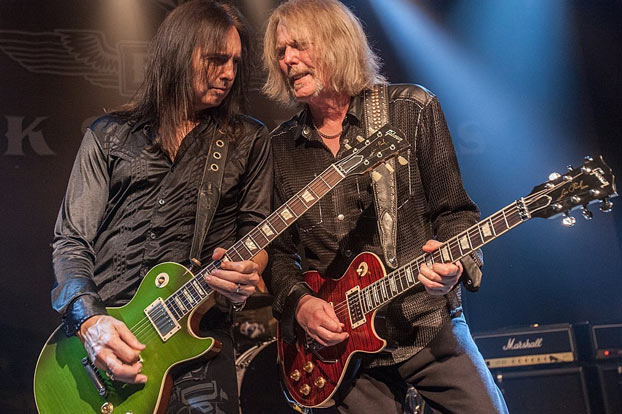Damon Johnson Talks New Black Star Riders Album, 'Heavy Fire'
All the latest guitar news, interviews, lessons, reviews, deals and more, direct to your inbox!
You are now subscribed
Your newsletter sign-up was successful

While continuing to pay homage to their Thin Lizzy legacy, Black Star Riders’ third album, Heavy Fire, also represents a major turning point for the band.
From the immediate riffs of “When the Night Comes In” to the dirty bass groove of “Thinking About You Could Get Me Killed” and the familiar, trademark dual guitars of Scott Gorham and Damon Johnson on “Testify Or Say Goodbye,” Heavy Fire takes the band out of the past and further cements Black Star Riders as one of the world’s premiere rock acts.
Black Star Riders are Ricky Warwick (vocals/guitar), Scott Gorham (guitars), Damon Johnson (guitars) and Robert Crane (bass).
I recently caught up with Johnson and asked him about Heavy Fire, his gear and more.
How would you describe Heavy Fire in terms of its sound and how it relates to some of the band’s previous work?
I would describe Heavy Fire as the album where we feel we’ve musically made a statement. It’s the final chapter in our trying to find a way to stand on our own. We’ll always be grateful and respectful to our past history—certainly Scott’s history—and without a doubt, the Thin Lizzy fan base and the support they’ve given us to even try something like this.
We’ve been touring, writing and recording over the course of the last four years and this was our opportunity to show we’ve made real progress. We’ve been energized and rejuvenated as a band at how great this album turned out. It’s very special to us.
What led to the transition from Thin Lizzy to Black Star Riders?
Ricky had joined Thin Lizzy in 2010 and I joined in 2011. Over the course of the dates we did together right after I joined, it was the first time Scott had brought up the subject of possibly making some new music and maybe even recording. For Ricky and me as fans, it was a dream come true to even consider having our contributions on a Thin Lizzy album, but we all quickly realized that to give the music a chance and for people to evaluate it on an even scale, it would be impossible to call it Thin Lizzy.
All the latest guitar news, interviews, lessons, reviews, deals and more, direct to your inbox!
There were multiple guitar players and periods of music the band captured and recorded and went out and played live over the years, but everyone knows the common thread in that band besides Brian Downey was Phil Lynott. So the idea that anyone would give thought to recording new music without Phil in the band seemed ridiculous. That’s when we said let’s not bail out on the idea of recording but instead call it something else.
It’s been very gratifying to get the feedback from fans, the media and even fellow musicians that respect that we would step away from an established name and record it under a different one, and that’s really what Heavy Fire represents to us. This is the one that pushed us up to the next level to where we can see ourselves as Black Star Riders.
How does the writing process work for Black Star Riders?
It comes from a multitude of things. Generally, it starts with a musical idea that’s quickly followed by a vocal melody. Sometimes Ricky will come to me with his guitar and will sing what might be a verse or chorus and we’ll throw it back and forth. Other times, Scott or I will have a riff and bring it to Ricky who will then look in his lyric notebook and, 19 out of 20 times, he’ll already have a cool lyric to go with it.
Let’s discuss a few tracks from the new album, beginning with the title track.
That was a weird one in the sense that it started out as a completely different song called “The Salvation,” right up until the final week of recording. It was the most perplexing song we had worked on. There were things about it we loved and other things we didn’t. There was also another song we had called “Heavy Fire” that didn’t make the final list of 11 that we were going to record, and toward the end of the process, Ricky had a stroke of genius and found a way to incorporate the “Heavy Fire” lyric into the music and arrangement we had for “The Salvation." It took a winding path to get to its final destination but we couldn’t be happier with how that song turned out. It’s a fitting one to be the title track on the new album.
“Testify Or Say Goodbye”
Ricky listens to a lot of Motown and Northern soul, because if we just listened to hard rock and metal we’d probably go insane. It’s good to shake things up and listen to some different melodies, arrangement and feel. For me, “Testify” is a great blend of classic vocal melody and harmony guitars.
“When the Night Comes In”
That was written very early in the process. It’s another punk rock guitar riff that Ricky came in with, but instead of slowing it down, this time we kicked the energy up and kept the tempo pretty fast. We had some amazing background vocalists join us in the studio for that one and for another track, “Ticket to Rise,” and were blown the way by the job they did. It really lifted the song.
What’s your current setup like?
For me, it’s been Gibson Les Pauls and Marshall or Wizard amps that I’ve been playing for the better part of 20 years. I am shamelessly classic rock and proud of it. I try to go for a guitar tone that’s transparent and not heavily distorted. Scott and I have a blend of two guitar tones that are fairly different. When you come to a show, you can definitely hear the difference between us.
Are there any other projects you’re working on?
I’ve recorded a great show with my solo band in my old hometown of Birmingham, Alabama, and my goal is to get it out this summer. I’m also sitting on about a dozen brand-new songs I’d love to get into the studio with. So, a live record this year and a full batch of new solo tracks the following year—and another Black Star Riders album in there somewhere as well!
What excites you the most about this next chapter of Black Star Riders?
This has been a giant leap forward for Black Star Riders, and I’m looking forward to seeing where it goes. We’re firing on all cylinders now and there’s great respect between each other musically, whether we’re writing or recording. Everybody is a pretty good listener in this band and I think that really shows on Heavy Fire.
James Wood is a writer, musician and self-proclaimed metalhead who maintains his own website, GoJimmyGo.net. His articles and interviews are written on a variety of topics with passion and humor. You can follow him on Twitter @JimEWood.
James is a guitarist and freelance writer who's interviewed some of the biggest names in music. He is the author of four books and his writing credits include work for Guitar World, AXS and Yahoo! as well as for his hometown newspaper where he writes on a variety of topics with both passion and humor. As a guitarist, he's performed everywhere from local bars and nightclubs to some of the biggest stages in front of thousands of music fans.

